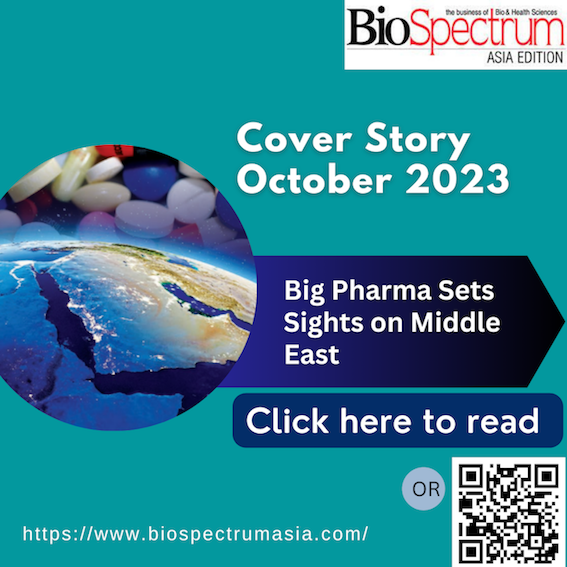Big Pharma Sets Sights on Middle East
October 03, 2023 | Tuesday | Analysis
Big pharma players are making substantial inroads into the Middle East, with the Kingdom of Saudi Arabia (KSA), Qatar, and the United Arab Emirates (UAE) leading the way in these regional efforts. Areas such as rare diseases, genomics, personalised medicines, and pharmaceutical manufacturing have emerged as hotspots in the Middle East. Let’s delve deeper into the region's endeavours to become a biotech powerhouse.

The Middle East is rapidly emerging as a key player in the global life sciences and pharmaceutical industry. With ambitious initiatives, strategic partnerships, and substantial investments, the region is poised to make significant contributions to healthcare innovation.
Over the last decade, the UAE's pharmaceutical industry has seen a significant transformation, with manufacturing facilities growing from four in 2010 to 23 in 2021. This expansion reflects a strong commitment to boosting regional pharmaceutical capacity, providing affordable, high-quality medicines, and fostering innovation. The local market's value has surged from $1.5 billion in 2011 to an estimated $3.7 billion in 2021, projected to reach $4.7 billion by 2025. The UAE now produces over 2,500 different medications, serving both domestic and global markets. In 2020, pharmaceutical exports reached $251 million to 48 countries, with an expected increase to $297 million by 2025. While imports remain significant at $2.6 billion in 2020, the sector offers substantial investment opportunities for sustainable growth, according to reports from ADQ.
Pharmaceutical companies have been increasingly investing in Saudi Arabia in recent years, attracted by the country's large and growing population, its strong healthcare infrastructure and the government's commitment to developing the sector as part of its ‘Vision 2030’ plan. According to a report from Fitch Solutions, in 2022, the Saudi pharmaceutical market reached SAR 44 billion ($11.7 billion). It's projected to hit SAR 56.6 billion ($15.1 billion) in 2027 with a 5.2 per cent CAGR (Compounded annual growth rate). Over the 10-year forecast, sales will grow at a 5.4 per cent CAGR, reaching SAR 74.3 billion ($19.8 billion) by 2032.
There have been concentrated efforts in this regard, along with a wave of other developments, signalling the region's commitment to becoming a powerhouse.
Big Pharma’s Middle East Push
Global biopharmaceutical companies are partnering and establishing local manufacturing sites in response to Saudi Arabia's Vision 2030. In July 2023, Sanofi collaborated with local biopharma firms Lifera and Arabio to boost local vaccine production, sharing expertise to manufacture seven key vaccines. This aligns with Saudi Arabia's goal of strengthening its healthcare capabilities and biopharmaceutical sector through technology transfer and workforce development.
In 2022, the Ministry of Investment (MISA) partnered with Novartis to enhance Saudi Arabia's biopharmaceutical capabilities. Their collaboration includes local investments in cell and gene therapy, technology transfer, and clinical research, with a goal to reduce healthcare budget pressures. Novartis' presence is expected to boost Saudi Arabia's GDP to around $857 million by 2024. In the same year, MISA also forged an agreement with British drugmaker GSK (GlaxoSmithKline) to further enhance the kingdom's healthcare and life sciences sector, reinforcing the region's position as a hub for research and innovation in life sciences.
In the neighbouring UAE, in June 2023, the Department of Health Abu Dhabi initiated (separate) collaborations with Eli Lilly and AbbVie Biopharmaceutical, setting the stage for clinical research, real-world evidence, healthcare technology, personalised medicine, and genomics in the capital of the UAE.
In September 2023, British pharmaceutical giant AstraZeneca inaugurated a sustainable office at Dubai Science Park. Furthermore, in May 2023, UK-based diagnostics firm Virax Biolabs, established its regional headquarters also at Dubai Science Park.
Initiatives and Investments
In June 2022, Saudi Arabia unveiled a $3.4 billion investment plan for the vaccines and vital medicines industry to strengthen pharmaceutical and health security. This initiative seeks to cut import expenses by emphasising the localisation of vaccines, plasma, and insulin technologies. The Manufacturing Vaccines and Vital Medicines Committee, led by the Minister of Industry and Mineral Resources, is supervising this endeavour, with a primary focus on children's vaccines, insulin manufacturing, and plasma derivatives in the initial stages. The ultimate objective is to position Saudi Arabia as a prominent player in the Middle East in the field of vaccines and vital medicines.
In the same year, Dammam Valley, in partnership with key entities including Saudi Aramco and government ministries, launched the Biotech Startups Program, a first-of-its-kind initiative in Saudi Arabia. This programme aims to promote biotechnology startups, facilitate global communication, offer investment opportunities, and nurture talent to address biotechnology challenges. It also focuses on technology transfer and localisation, aligning with national biotechnology strategies, and provides management instruction and consultancy to develop biotechnology expertise.
The UAE's pharmaceutical sector is rapidly expanding to meet the demands of a growing population, aligning with the Abu Dhabi 2030 Healthcare Life-Science Vision. By 2030, Abu Dhabi aims to become a global destination for life science investment. Notably, in 2022, the region saw a remarkable 48 per cent increase in clinical trials, thanks to expedited approval processes that take just 28 days. The city also witnessed a 40 per cent increase in incubated startups and welcomed 86 new companies into its ecosystem in the same year, reflecting a thriving entrepreneurial environment.
Furthermore, the UAE is set to inaugurate its first robotic biobank in 2023, a collaborative effort between Al Jalila Foundation, MBRU, and DHA. This cutting-edge biobank, boasting a capacity for seven million specimens, will be situated within Dubai Healthcare City at the Mohammed Bin Rashid Medical Research Institute. Its primary mission is to advance research in genetic disorders, cancer, chronic illnesses, and pandemics, providing substantial support to healthcare institutions like the Hamdan Bin Rashid Cancer Charity Hospital.
Promise of the Middle East
The Middle East's booming pharmaceutical market is a magnet for pharmaceutical companies due to increased government support, strategic geography, pro-industry policies, regional harmonisation efforts, and pressing healthcare needs.
“The Middle East has been attracting life sciences companies due to its large healthcare services sector, increasing focus on disease research, and increasing emphasis on proactive preventive healthcare. The region’s medical imaging market, which surpassed $20 billion in 2021, is projected to exceed $30 billion by 2029, with an expected CAGR of 5.5 per cent from 2022 to 2029, providing promising opportunities for companies like Lunit,” Brandon Suh, CEO, Lunit Inc.
Lunit, a leading provider of AI-powered solutions for cancer diagnostics and therapeutics, is expanding rapidly in the Middle East. The firm in July 2023 signed a commercial contract with Cloud Solutions, a Saudi-based subsidiary of Dr. Sulaiman Al Habib Medical Group (HMG), to supply their AI mammography solution, Lunit INSIGHT MMG. This agreement follows a previous collaboration in June 2023 with Seha Virtual Hospital, also in Saudi Arabia, where Lunit supplied their chest and mammography AI solutions, LUNIT INSIGHT CXR and MMG.
“Lunit’s expansion into the Middle East was motivated by the region’s growing biotech and pharma market, with a notable emphasis on the region’s ambition to strengthen the AI industry,” Brandon Suh explained.
In February 2023, another Asian firm, Hong Kong-based Insilico Medicine, an AI-driven drug discovery company opened Insilico Medicine Generative Artificial Intelligence and Quantum Computing Research and Development Center in Abu Dhabi, the region’s largest AI-powered biotechnology research centre.
“In the rapidly evolving landscape of the Middle East’s pharmaceutical sector, several key factors stand out as attractors for global companies. The Middle East offers untapped opportunities, supported by favourable governmental regulations and policies. Additionally, there is a significant investment in the healthcare infrastructure. In the Gulf Cooperation Council (GCC) alone, there is a pipeline of more than 160 healthcare projects with a combined value of over $53 billion. This demonstrates the immense commitment to healthcare as a priority sector,” said Mohamed Abu Shawish, General Manager GCC, Kyowa Kirin.
The increased government spending and public-private partnerships are also creating a fertile ground for innovation and growth in the biotech and pharmaceutical sectors.
“More and more pharmaceutical companies are assessing their strategies for the Middle East, a market where biotech and pharmaceutical companies are seeing rapid growth. This growth is driven by several factors, including a surge in government spending for healthcare initiatives. The region is increasingly burdened by health issues such as obesity, heart disease, and chronic conditions due to an ageing population, urbanisation, and lifestyle changes. These issues are pressing healthcare systems, leading to increased investments by biotech and pharma companies to meet the growing demand for innovative healthcare solutions. For example, in Saudi Arabia, the country has made a substantial investment in research and development since 2021 in biotech offerings, including establishing advanced biotech clusters. This investment demonstrates the country’s commitment to fostering innovation and growth in pharma,” said Ravi Visweswara, Executive Vice President, Asia Pacific, EVERSANA.
EVERSANA is the pioneer of next-generation commercial services to the global life sciences industry. In 2022, the firm partnered with Dubai-based Vector Pharma FZCO to expand its services in the Middle East and North African markets.
The Middle East serves as a strategic link between Europe, Asia, and Africa, enabling the efficient distribution of pharmaceutical products to diverse markets. This geographical advantage makes it an attractive destination for companies seeking global expansion.
“As the region continues to evolve as a hub for healthcare innovation and distribution, pharmaceutical and biotech companies will continue to develop and implement programmes to support the growing healthcare demands in the region and beyond. For these organisations, it’s critical that they understand the dynamics of the region and have the right partners in place with local knowledge to help companies bring therapies to market as quickly as possible to ultimately help patients,” added Ravi Visweswara.
Key sectors of growth opportunities
Genomics
In response to a rising prevalence of genetic disorders, Saudi Arabia initiated the Saudi Human Genome Program (SHGP) to expedite genetic disease diagnosis, expand genetic databases, and enhance understanding of inherited diseases. Qatar established the Qatar Genome Programme (QGP) to investigate genomics and genetics in the Middle East, with a focus on precision medicine and research capacity building. Most recently, in March 2023, the UAE launched the National Genome Strategy, aiming to establish a legal framework supporting genomic programmes for improved public health and personalised medicine to combat various diseases over the next decade.
This has led to an increase in demand for sequencing technologies and several companies have responded to the growing demand by launching new technologies and expanding their presence in the Middle East. Building on this trend, April 2023 saw Malaysian Genomics making significant inroads in Middle East expansion through various partnerships.
In June 2023, CENTOGENE partnered with Lifera, a biopharmaceutical company owned by the Public Investment Fund (PIF), to establish a Saudi Arabian joint venture. This venture aims to enhance access to leading data-driven multi-omic testing and secured a substantial $30 million investment.
In 2022, Illumina contributed to the genomic landscape by launching its state-of-the-art Solutions Center in Dubai, United Arab Emirates.
Precision Medicines
In 2022, Abu Dhabi launched the region's first Personalised Precision Medicine Programme for oncology, utilising genomics to transform diagnostics, drug therapy, and prevention.
ASPIRE, the technology programme management arm of Abu Dhabi's Advanced Technology Research Council (ATRC), allocated over AED 200 million in funding over five years to support three Virtual Research Institutes (VRIs) in priority sectors. Two VRIs hosted by the United Arab Emirates University (UAEU), including the Abu Dhabi Precision Medicine Virtual Research Institute (ADPM VRI), aim to revolutionise biotechnology research and healthcare impact. In 2020, Dubai opened its state-of-the-art genomics centre at Al Jalila Children’s Hospital, offering genetic testing and counselling. Dubai is also set to host the Middle East's inaugural Precision Medicine Exhibition and Summit in 2024, highlighting the region's commitment to advancing precision medicine in healthcare.
Rare diseases
Rare diseases in the Middle East are receiving a significant boost through a partnership between Burjeel Holdings, a major MENA healthcare provider, and US-based BridgeBio Pharma. Their collaborative project announced in July 2023 'NADER' (Needs Assessment and Therapeutics Development for Rare Diseases) aims to revolutionise early diagnosis and treatment. This initiative will deploy cutting-edge risk assessment algorithms using Burjeel's secure data, capitalising on Abu Dhabi's advanced healthcare infrastructure.
Furthermore, in August 2023, Abu Dhabi Health Services Company (SEHA) and Sanofi have also teamed up to enhance rare disease diagnostics, focusing on accelerating screening for lysosomal storage disorders. These endeavours underline the region's commitment to improving care for rare diseases in the Middle East.
Manufacturing
In a concerted effort to bolster local pharmaceutical manufacturing and enhance healthcare capabilities in the Middle East, Saudi Arabia and the UAE have embarked on a series of strategic partnerships and initiatives. In August 2023, Saudi Arabia's Public Investment Fund (PIF) announced the establishment of the Pharmaceutical Investment Co. (Lifera), a contract development and manufacturing company, marking a significant step towards achieving the kingdom's vision of becoming a global pharmaceutical manufacturing hub. Simultaneously, Unified Capital and Investments teamed up with Fenway Pharmaceuticals in June 2023 to establish a cutting-edge manufacturing unit in Saudi Arabia, reinforcing the country's pivotal role in the pharmaceutical sector.
Furthermore, Gulf Pharmaceutical Industries PJSC (Julphar) signed a landmark licensing partnership with China's Sunshine Lake Pharma in May 2023, positioning Julphar as the first in the MENA region to locally manufacture modern insulin analogues, a critical step in addressing the region's escalating diabetes challenges. These initiatives underscore the commitment to advancing healthcare and industry in the Middle East, aligning with national strategies and visions for technological advancement and economic diversification.
“Middle Eastern governments have introduced policies and regulations to incentivise the localisation of pharmaceutical manufacturing. The GCC’s drug price harmonisation strategy has standardised drug prices across the region, providing a more predictable pricing landscape for manufacturers and consumers alike. Such measures create a stable environment for pharmaceutical companies to settle and flourish within the region. Within that environment, companies must learn the intricacies of local policies and competition and determine the strategy that will help them succeed,” said Visweswara.
Ageing and Longevity
One of the components of Saudi’s Vision 2030 is to increase the average life expectancy from 74 years to 80 years. In 2022, the quest was kicked off by the Hevolution Foundation, a not-for-profit organisation that provides grants and early-stage investments to incentivise research and entrepreneurship in healthspan science. They allocated up to SAR 10 million for this initiative. In May 2023, Hevolution Foundation expanded globally with the ‘Hevolution Foundation- Geroscience Research Opportunities’ (HF-GRO) programme, allocating up to $115 million for pre-clinical ageing biology and geroscience research.
In September 2023, Abu Dhabi's Mubadala made a strategic investment in Swiss biotech company Rejuveron Life Sciences AG, specialising in therapies for age-related diseases. This funding round valued Rejuveron at approximately $400 million, and as part of its expansion strategy in the Middle East, Rejuveron announced plans to establish an office in Abu Dhabi.
While the Middle East has made substantial strides in advancing its life sciences and pharmaceutical sectors, it's essential to acknowledge and address challenges that could potentially impede further progress. One such challenge lies in the need to establish effective intellectual property protections to incentivise innovation and protect the rights of pharmaceutical innovators. Additionally, considerations surrounding procurement systems favouring local drug manufacturers and pricing policies should be carefully evaluated to maintain a conducive investment climate, according to Fitch Solutions. As the Middle East continues to evolve as a prominent player in the life sciences arena, addressing these issues will be crucial in sustaining its growth and impact on global healthcare advancements.
Ayesha Siddiqui






